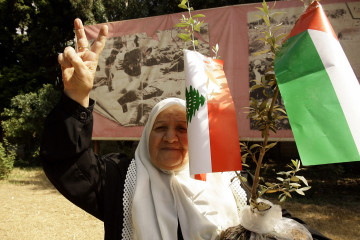

Rania Saadallah's afternoon was violently shattered by a barrage of rockets that pierced the air, leaving her engulfed by a profound sense of fear.
"The loudest sounds happened around afternoon. We thought that the war had reached Lebanon," Rania told The New Arab.
The sound came from rockets fired from the southern Lebanese town of Qolaile towards Israel on Tuesday. The attack was later claimed by the Palestinian faction, Hamas.
"There is a sense of despair, frustration, grief, and fear that fills the camp. The streets are empty, and the echoes of the televised news permeate the air"
That night, Israel responded with white phosphorus munitions along the southern border with Lebanon, catching fire in the gardens of local residents and pine groves nearby.
This comes amidst Hamas' unexpected offensive against Israel which began on October 7. Israel responded with a devastating military strike on Gaza. The blockaded region has already been decimated by some of the most intense violence it has ever seen.
It is undeniable that Gaza residents endure the most profound suffering, making their pain unparalleled. However, Palestinians residing in refugee camps in Lebanon - who were forcibly displaced from their homeland decades ago and now reduced to mere bystanders - have reported experiencing unprecedented agony, along with a well-known sense of hope.
The idea of Palestinian resistance has evolved, and every day is filled with uncertainty about what the future holds.
For Rania, a Palestinian refugee in the Rashidiye camp in southern Lebanon, her daily routine has been disrupted as she now stays glued to her television for updates.
"It is impossible to escape the news," she said. "There is a sense of despair, frustration, grief, and fear that fills the camp. The streets are empty, and the echoes of the televised news permeate the air."
Work has become a secondary concern. Agricultural workers from the camp near the border, for instance, stopped working to avoid being targeted by Israeli forces.
On the first day of Hamas' operation, hundreds of people across Lebanese refugee camps took to the streets to celebrate the historic event. It restored a sense of hope and possibility for the people to return to their homeland. However, the situation is now significantly different, and celebrations have come to a halt.
Palestinian activist and media professional Dina Agha told The New Arab that the feeling of victory has been intertwined with grief and sadness over Gaza's atrocities.
"Instead of wishing my friends good morning, I ask if they're still alive," Dina stated.
Israel has cut fuel and electricity supplies and bombed two principal telecommunications companies in the Gaza Strip, putting more than two million residents at risk of blackouts.
Due to intermittent internet connectivity, Dina's friends' responses are delayed, causing communication to halt for hours.
"This is where our responsibility as media professionals lies," she said. "Though many of our posts and pages get suspended, deleted, or blocked, we learn to work around the algorithm and ensure we always share updates."
"As a people we have surpassed the limits of endurance and we are prepared to sacrifice our lives if it means returning home"
It becomes difficult to authenticate information when the sources in Gaza become inaccessible. The fight against false information and the need to spread the truth about the situation in Gaza has become a pressing issue.
Many are attempting to tarnish the image of Palestinians with misinformation, and it has become imperative to combat it.
Sharing authentic information and visuals may help change the narrative and perception of foreigners, particularly in the West, about Palestinians.
Critics have pointed out that the media has become dominated by framing Hamas in simple terms as the sole antagonist, omitting all other political and historical factors.
"While the media has also persistently portrayed Palestinians as helpless victims, this time we showed strength and refusal to be silenced," the activist noted, adding that resistance has taken on a new meaning this time around, putting the Palestinians on the front lines as a force not to be underestimated.
Palestinian activist from Mar Elias camp in Beirut, Ghada Daher echoed this sentiment, stating that this is proof to the world that Palestinians will not give up their homeland.
"Now even our non-Palestinian peers are greeting us differently and looking at us with more pride," she told The New Arab.
Although they feel powerless in not being able to assist their Gazan counterparts, Ghada stated that many Palestinians in the diaspora and refugees would be willing to fight for their country if borders were open.
"We sometimes hear from friends in Gaza that they spend the entire night hiding, only to wake up the next day to find entire areas destroyed and their loved ones gone," she said. "I would, without a doubt, be willing to send myself, my three sons, and my daughter to combat if borders opened," the activist added.
Despite the potential of a war between Lebanon and Israel, as experienced in 2006, Dina and Ghada shared that they would not be as scared this time around. This is because they believe that this war could be the decisive battle that will help them reclaim their land.
"As a people we have surpassed the limits of endurance and we are prepared to sacrifice our lives if it means returning home," Ghada said.
Dana Hourany is a multimedia journalist based in Beirut.
Follow her on Twitter: @DanaHourany




 Follow the Middle East's top stories in English at The New Arab on Google News
Follow the Middle East's top stories in English at The New Arab on Google News


